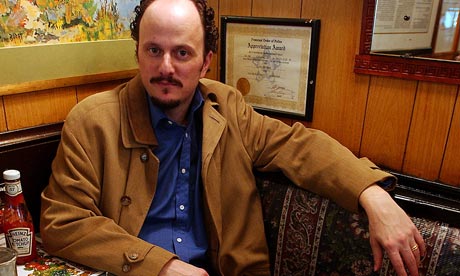- Eight years on from his Pulitzer prize-winner, novelist says he is 'two-thirds done' on 'tightly dramatised' love story

Jeffrey Eugenides will never win any prizes for speed: almost 10 years elapsed between the publication of his acclaimed debut, The Virgin Suicides, and his Pulitzer prize-winning follow-up, Middlesex. But finally, a mere eight years after Middlesex appeared, Jeffrey Eugenides has revealed that an end is in sight for his third novel.
In a conversation with his American publisher, Jonathan Galassi, at Farrar, Straus and Giroux, Eugenides said that the book was "about 400 pages long so far, and two-thirds done". "I don't think it will be a long book, not as long as Middlesex, anyway. It's different from my other books. More tightly dramatised, less fanciful," he said. Middlesex, which traced the path of the hermaphrodite gene through generations of a family, stretched to almost 550 pages.
The untitled new novel – Eugenides didn't want to reveal its name – is a kind of college love story, according to the author. "It begins on graduation day, in 1982, and involves three main characters. The sweep of the action takes place over the next year or so, as the characters begin their lives outside the university gates. The book deals, among other things, with religion, depression, the Victorian novel and Roland Barthes," he revealed to Galassi (the discussion was published in FSG's new monthly newsletter, Work in Progress). "It's not a Detroit book, not this time. Though one of the characters comes from Detroit, the new book ranges in setting from Providence, Rhode Island, and Cape Cod to Calcutta."
The Indian section, and a fragment about a backpacking trip through Europe, draw on the year he spent travelling the world after college. "I've had to pare down the autobiography in order to find the fiction," said Eugenides. "I'll tell you what: I wouldn't want to write a memoir. In the first case, autobiography is a largely fraudulent exercise. People don't understand their lives or what happened to them; they only think they do. In the second case, autobiography (or life) is artless. When I try to write autobiographically, I end up putting in scenes and events that blur the 'truth' of what I'm trying to write about. Bellow was good at writing about himself, but not me. I don't know who I am. I have to transform autobiography into fiction, which means that I use my imagination at least as much, if not more, than my memory."
The new novel originally had its roots in another book entirely. Eugenides started out writing a story about a family throwing a debutante party, but as he followed one of the characters, "her story began to swell until I finally realised that I had two different books on my hands". He had to "surgically separate" the books, "like conjoined twins, hoping that each retained sufficient major organs to survive". The first is now residing in a drawer as he works on the second.
Galassi pointed out that there were parts of Middlesex, too, which didn't make it into the final text – Eugenides originally had two completely different versions of the book on the go, with one, told from many points of view, including sexologist Dr Peter Luce's trip to the jungles of Papua New Guinea to study a tribe with the same genetic mutation as Cal. "I believe one of the reasons they didn't make it into the final text was that you, dear Editor, weren't so sure about them," Eugenides told Galassi.
"It was fascinating stuff, based on facts, and presented a people who have developed a third gender category to accommodate their ambiguous offspring. Anyway, as I recall, you liked that version well enough, but said that you didn't know what that book was. Whereas, with the other version (the manuscript that became Middlesex), you did know what that was. You didn't force me to choose between the two, but you helped me to choose," Eugenides said.
"There were a lot of things to like about Version #2, but there were limitations as well. Mainly, it threatened to spin out of control ... I had a big story to tell already and to add subplots involving sexologists in the jungle ... you were probably right."
Middlesex has sold more than two million copies, according to FSG. Eugenides's debut, The Virgin Suicides, is about the suicide of five sisters and was made into a film by Sofia Coppola in 1999.
No comments:
Post a Comment